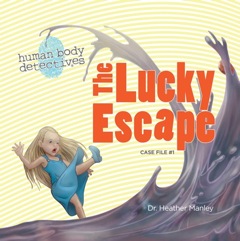by Dr. Heather Manley
Kids lead a stressful life. When babies, they are constantly learning – crawling, walking, talking – and as they become older, they are taking tests, dealing with everyday social issues and the emerging hormones.
Stress is a part of everyday life for all, however, the key to handling stress is how you react to it which is very important as stress negatively affects many parts of the body, especially the immune system. A compromised immune system will adversely affect our children’s health. We can help our children by showing them positive ways to deal with everyday stresses, diet and healthy lifestyle habits. To have a clearer understanding of stress in the body and the benefits to boost immune system, lets discuss the physiology.
The Physiology of Stress
 The big stress hormone we hear about is cortisol. We need this amazing hormone to function everyday in response to stress and anxiety. It all begins in the part of the brain called the hypothalamus that will sense a need for cortisol. The hypothalamus will then send a message to the pituitary gland to inform the adrenal glands ( located on top of each kidney) to release cortisol. The majority of cortisol is released in the early mornings – and one could even say that it is the hormone that helps us get out of bed – and then tapers off during the day. On a very positive note, it keeps us going and moving throughout the day, helping us handle everyday stress. However, if too much cortisol is released ( possibly due to increased stress and anxiety) blood sugar and cholesterol will increase and immune function will decrease. These can led to serious illnesses.
The big stress hormone we hear about is cortisol. We need this amazing hormone to function everyday in response to stress and anxiety. It all begins in the part of the brain called the hypothalamus that will sense a need for cortisol. The hypothalamus will then send a message to the pituitary gland to inform the adrenal glands ( located on top of each kidney) to release cortisol. The majority of cortisol is released in the early mornings – and one could even say that it is the hormone that helps us get out of bed – and then tapers off during the day. On a very positive note, it keeps us going and moving throughout the day, helping us handle everyday stress. However, if too much cortisol is released ( possibly due to increased stress and anxiety) blood sugar and cholesterol will increase and immune function will decrease. These can led to serious illnesses.
A parents note: Many parents ask me why their children are fine during the day but as soon as it is bedtime a fever or ear ache will erupt. This is because cortisol is in minimal amounts at night thus the body is more sensitive to pain.
Hans Seyle, M.D wrote a well-known book called the, Stress of Life. It was given to me during my medical school years and I found it quite a helpful theory in understanding stress and the ability of people to adapt to the pressures of daily life, injury, disease, and relationships. In his book, he spoke about the three stages of adapting to stress:
1. Alarm – “fight or flight”
2. A resistance to the stress ( adaption where the body adapts as stress continues)
3. Exhaustion
The “fight or flight” is a normal physiological reaction, however, if continually used, the body will adapt and eventually become completely exhausted. In general, stress may be due, on a physical plain, with poor nutrition, poor sleep, pollution, infections, alcohol and/or from a mental state of grief, over worked, anxiety, relationships, anger, aging.
People can make changes to their physical states by eating whole ( real) colorful foods, and decreasing exposure to pollution and household chemicals. With the mental state, it is not so much whether the situation is pleasant or unpleasant but more so how we react to it.
Tips to Help Handle Stress
Exercise: How? For prevention, take a 15 minute walk outside with the kids. When in a moment, have everyone stop and do 10 jumping jack ( usually everyone will begin laughing which will add more stress reduction!)
Color: How? Eat whole ( non processed) colorful nutrient packed foods at every meal. Avoid white foods: sugar, bread, rice.
Structure: How? To keep the blood sugar levels stable eat a structured and regular meal plan – 3 meals a day – plus healthy snacks in between.
Drink: How? Drink pure filtered water. If plain water doesn’t excite the kids, infuse with colorful lemons and oranges.
Sleep: How? Listen to Stress Free Kids CDs to relax the kids and allow for a full night sleep.
Laugh: How? Get in the habit of telling jokes as laughing strengthens the immune system.
Teach: How? Teach your children to take deep belly breaths.
The key is to be aware of what is going on in your life as well as your child’s and finding more ways to bring joy, laughter and happiness in.
Be well,
drheather
Dr. Heather Manley, who in 2001 received her medical degree from the National College of Naturopathic Medicine in Portland, Oregon, is a practicing physician whose primary interest is preventative healthcare for families. She is the author of Human Body Detectives, her children’s educational series of story-telling books, ebooks, and iphone/ipad apps. She also promotes wellness and naturopathic healthcare on her website drheathernd.com. She lives on the Big Island of Hawaii with her husband and two daughters, and is currently at work on the next Human Body Detectives adventure and is very excited for her upcoming launch of HBDs Go to School elementary curriculum.
Follow drheather on twitter and facebook
Indigo Dreams: Garden of Wellness encourages children to make healthy food choices!